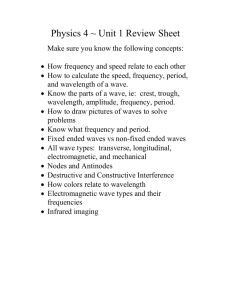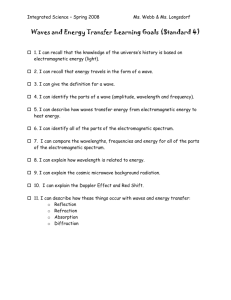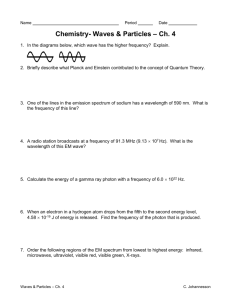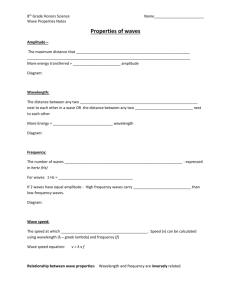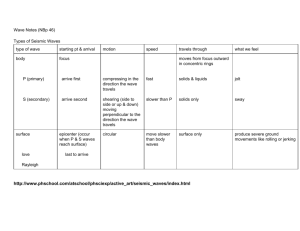PreAP Waves and Sound
advertisement
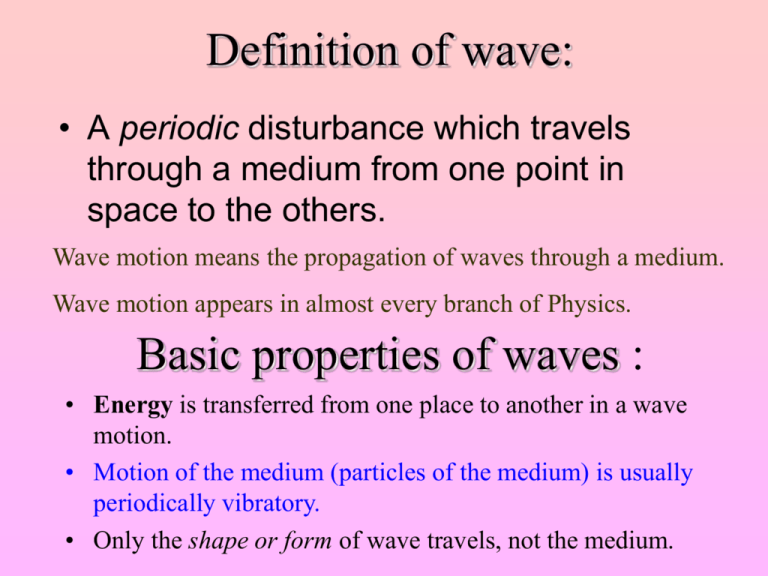
Definition of wave:
• A periodic disturbance which travels
through a medium from one point in
space to the others.
Wave motion means the propagation of waves through a medium.
Wave motion appears in almost every branch of Physics.
Basic properties of waves :
• Energy is transferred from one place to another in a wave
motion.
• Motion of the medium (particles of the medium) is usually
periodically vibratory.
• Only the shape or form of wave travels, not the medium.
TYPES OF WAVES
Waves are classified into different types
according to their natures :
WAVES
Mechanical waves
Transverse waves
Electromagnetic waves
Longitudinal waves
Transverse waves
Mechanical Waves
• A material medium is necessary for the transmission for
mechanical waves. Mechanical waves cannot travel through
vacuum.
• Due to elastic forces on adjacent layers of medium, disturbance is
transmitted from one layer to the next through the medium.
Water waves, sound, vibration of spring, etc.
And ...
according to the direction of vibration, waves are also
classified into :
(a) Transverse wave;
(b) Longitudinal waves.
Transverse Waves
• The waveform appears in the shape of sine curve.
• A wave in which the motions of the matter particles are
perpendicular to the direction of propagation of the wave itself.
Water waves, pulse in a stretched
string,transverse wave demonstrator.
Longitudinal Waves
• A wave in which the motions of the matter particles are in the
same direction as the wave propagation.
Sound, or a spring oscillating up and down, etc.Show
magnetic longitudinal demonstrator
Seismic Waves
Seismic waves use Earth itself as their medium. Earthquakes produce
them and so does a nation when it carries out an underground nuclear
test. (Other countries can detect them.) Seismic waves can be
longitudinal, transverse, or surface waves. P and S type waves are
called body waves, since they are not confined to the surface. Rayleigh
waves do most of the shaking during a quake.
Name
P Wave
Type
Info
Longitudinal
Also known as primary, compressional,
or acoustic waves; fastest seismic wave
S wave
Transverse
Rayleigh
Wave
Surface
Love Wave
Surface
Also known as secondary, or shear
waves
do not travel through fluids;
Rolls along surface like a water wave;
large amplitude
Ground moves side to side
Seismic Waves
Vibrations passing through the ground that result from an
earthquake
The seism focus generates spherical pulses
or primary (P) waves, which propagate like
concentric waves.
P waves have a longitudinal action; they cause change
in volume (compression and dilatation of the ground)
- Their velocity is high: 5 – 8 km/s.
S (secondary) waves, induced by P waves, are
transversal waves (soil oscillates perpendicular to direction)
- They are very destructive.
- Their velocity is around 3 – 5 km/s
Terminology of a Wave
A wave is usually described by the following terms :
•
•
•
•
•
Amplitude
Wavelength ()
Frequency (f)
Period (T)
Wave velocity (v)
Each term will be explained….
• The amplitude is the maximum displacement of the medium
from its equilibrium position.
• The wavelength () is the minimum distance between two
points which are in phase.
• The frequency (ƒ) is the number of complete oscillations
made in one second.
Unit : Hz
• The period (T) is the time taken for one complete oscillation.
It is related to frequency by T = 1/ƒ
Unit : s
Frequency and Period are related
T = 1/f
F= 1/T
The Wave Equation
The wave velocity is the displacement traveled
by the wave in one second ……....
The wave velocity (v) is related to
frequency and wavelength by -The Wave Equation
v = ƒ
Using the Wave Equation
Example :
A traveling wave of wavelength 0.6m moves at a speed of 3.0 m/s.
What is the period of this wave ?
Now you know = 0.6 m, v = 3.0 m/s
Can you find the frequency of this wave……
By using the wave
equation,
v = ƒ
3.0 = ƒ(0.6)
i.e ƒ = 5.0 Hz
Then the period of this wave is ???
Period T = 1/ƒ
T = 1/5.0 or 0.2 s
Table of
Contents
Practice problems 12 D page 457
Work problems 1-4
• Transmission of
energy
• Reflection
• Refraction
• Diffraction
• Interference
Let’s take water waves as an example to
study the characteristics of waves….
The behavior of water waves demonstrates
all these characteristics……..
Reflection (bounce)
Reflection
Reflection of Waves Reflection of Waves
A traveling wave is reflected when it hits a barrier.
This phenomenon can easily be observed when a traveling water
wave hits a reflector in the ripple tank.
Reflector
Reflected
waves
Reflection
The law of reflection: the angle of
incidence equals the angle of reflection
NOTE: Angles in optics
are taken from the normal
line to the surface
Refraction (bending of waves)
Refraction of Waves
- The speed of a water wave increases with depth. This change
in speed is accompanied by refraction.
This effect is a consequence of the wave equation, v = ƒ.
Since ƒ is constant, a decrease in v produces a decrease in .
Diffraction of Waves
When a traveling water wave hits an obstacle, the wavefronts
spreads out round the edge and becomes curved.
This phenomenon refers to diffraction.
The wavelength of the wave is not changed in diffraction.
Diffraction
Small openings cause diffraction,
even curved waves will diffract
Two openings will allow
diffracted waves to interfere with
each other.
Interference
• when two waves are combined, either
constructive or destructive interference can
occur.
constructive
interference
destructive
interference
Constructive Interference
Destructive Interference
Polarization
• a transverse wave is
linearly polarized with
its vibrations always
along one direction
• a linearly polarized
wave can pass through a
slit that is parallel to the
vibration direction
• the wave cannot pass
through a slit that is
perpendicular to the
vibration direction
Polarizing sunglasses
Polarization
is known as
ACOUSTICS
Properties of Sound
• A sound is a vibration
• The vibrating causes the air molecules near the
movement to be forced closer. This is called compression
• As the vibration moves on, the density and air pressure
becomes lower than normal and is called rarefaction
• Pressure wave – longitudinal
• Frequency = pitch
• v = 334 m/s in air at room temperature
• Velocity is dependent upon the material
Guitar String
creating a sound wave
Animations courtesy of Paul Hewitt
and borrowed from physicsclassroom.com
Can
affect
speed
Do molecules move faster or slower
as temperature increases?
So would sound travel faster or slower as
temperature increases?
•requires a medium
(cannot travel in a
vacuum)
Solid
Liquid
Gas
Waves travel fastest in solids, slowest in gases.
•Fastest in solids, slowest in gases.
Air = 340 m/s
water= 1440 m/s
steel = 5000 m/s
•Supersonic: faster than the
speed of sound.
http://www.youtube.com/watch?v=
-d9A2oq1N38&feature=related
• Sound travels faster in warm water than in cold water
• By measuring the time it takes for sound to travel a
known distance through the ocean the average
temperature of the water can be calculated = ATOC
(acoustic thermometry of ocean climate)
Speeds of Sound
at Temp = 200 C
•
•
•
•
•
•
•
•
Air
Helium
Hydrogen
Water
Sea water
Iron/Steel
Glass
Aluminum
•
•
•
•
•
•
•
•
343 m/s
1005 m/s
1300 m/s
1440 m/s
1560 m/s
≈5000 m/s
≈ 4500 m/s
≈ 5100 m/s
The highness or lowness of sound.
Depends on the frequency of sound waves.
High frequency = High pitch
Low frequency = Low pitch
•Also called LOUDNESS
•Amount of energy
•Depends on the amplitude of sound waves.
(amplifier)
Large Amp. = Loud sound
Small Amp. = Soft sound
Intensity of Sound
• Unit is the “Bel”. Named after Alexander
Graham Bell
• More commonly used is the decibel (dB)
Some Intensities (in dB)
•
•
•
•
•
•
•
•
Jet plane at 30 m
Threshold of pain
Indoor rock concert
Auto interior
Street traffic
Conversation
Whisper
Rustle of leaves
•
•
•
•
•
•
•
•
140
120
120
75
70
651
45
20
•Sound waves reflecting from hard surfaces
•Ex.: Multiple echo resulting from the direct
sound AND the reflected sound
Reverberation vs Echo
Animations courtesy of Paul Hewitt
and borrowed from physicsclassroom.com
Measurement of
loudness
Near total silence - 0 dB
A whisper - 15 dB
Normal conversation - 60 dB
Lawnmower - 90 dB
Threshold of pain - 120 dB
A rock concert or a jet engine - 120 dB
Gunshot, firecracker - 140 dB
Sound is a pressure wave
Animations courtesy of Paul Hewitt
and borrowed from physicsclassroom.com
Resonance
Forced vibrations
Something makes something else vibrate that
has the same natural frequency.
Examples of Resonance
•
•
•
•
•
Tuning forks
Resonance boxes http://www.youtube.com/watch?v=hiHOqMOJTH4
Tacoma Narrows Bridge
Wine glasses
Shattering a wine glass http://www.youtube.com/
watch?v=Jy8js2FmGiY
Ear
Range of Human Hearing
20Hz through 20,000Hz typical people can
hear these frequencies
Above or below, we can’t hear.
Infrasonic – too low to hear
Ultrasonic – too high to hear
http://www.freemosquitoringtones.org/hearing_test/
Mosquito
ringtones,
do they
work?
Tuning fork
creating a sound wave
Animations courtesy of Paul Hewitt
and borrowed from physicsclassroom.com
Ultrasounds
• Ultrasound can be used to create internal
images of the human bodyx. Pregnant woman
gets a “picture” of her unborn baby
Ultrasound of 13 week old
http://www.youtube.com/watch
?v=TW6aMRUqeZU&feature
=related
Used to locate underwater
objects and distances.
How deep is the water in
this picture? Speed of sound
in water is 1400m/s. Time
from emitted sound until
detected is 1.5seconds.
Echolocation
Doppler Effect
• Apparent change in frequency (pitch) of a
sound from a moving source.
Change in pitch due to motion.
http://www.youtube.com/watch?v=O5rqMPdQMQ8
*Moving towards increases the
pitch
*Moving away decreases the pitch
*Think of sirens
Doppler Radar
Electromagnetic Waves
All travel at the same speed in
the same medium.
Fastest in a vaccuum, slower in
air, slower under water, …
All are produced by a
vibrating Charge (usually an
electron)
Wave Particle Duality of Light
Light is a wave (it diffracts, interferes, and
refracts)
Light is a particle (it is affected by gravity and
travels in a vacuum) (it behaves like it has
mass but it doesn’t)
A photon is a tiny package of energy and the
way to conceptualize light.
Light is both a wave and a particle
Electromagnetic Waves
• Material medium is not essential for propagation. e/m
waves travel through vacuum.
• Disturbance of electric and magnetic fields traveling
through space.
• All electromagnetic waves are transverse waves.
X-rays, radio waves, micro-waves,etc.
Electromagnetic Waves
Energy produced by the oscillation of an electric charge
which produces electric and magnetic fields
(spectrum is any range of wavelengths or frequencies)
X-Rays
- Discovered by accident in 1895 by German
scientist Wilhelm Conrad Roentgen while
experimenting with vacuum tubes
A week later he took this x-ray of his wife
The Earth's atmosphere is thick enough that virtually
no X-rays are able to penetrate from outer space all
the way to the Earth's surface
Many things in space emit X-rays:
black holes, neutron stars, binary star
systems, supernova remnants, stars, the
Sun, and even some comets!
Supernova remnants in the
Small Magellanic Cloud
C = the speed of light
3.0 x
8
10
(and all EM waves)
m/s
186,000 miles/sec
Nature of Electromagnetic Waves
They are Transverse waves without a medium. (They
can travel through empty space)
They travel as vibrations in electrical and magnetic
fields.
Have some magnetic and some electrical properties to
them.
Speed of electromagnetic waves = 300,000,000
meters/second (Takes light 8.3 minutes to move from
the sun to earth {93 million miles} at this speed.
When an electric field changes, so does the magnetic
field. The changing magnetic field causes the
electric field to change. When one field vibrates—
so does the other.
RESULT-An electromagnetic wave.
Waves or Particles
Electromagnetic radiation has properties of waves but also
can be thought of as a stream of particles.
Example: Light
Light as a wave: Light behaves as a transverse wave which
we can filter using polarized lenses.
Light as particles (photons)
When directed at a substance light can knock electrons off
of a substance (Photoelectric effect)
B. Waves of the Electromagnetic Spectrum
Electromagnetic Spectrum—name for the range of electromagnetic
waves when placed in order of increasing frequency
RADIO
WAVES
INFRARED
RAYS
MICROWAVES
ULTRAVIOLET
RAYS
VISIBLE LIGHT
GAMMA
RAYS
X-RAYS
RADIO WAVES
A. Have the longest wavelengths and lowest frequencies
of all the electromagnetic waves.
B. A radio picks up radio waves through an antenna and
converts it to sound waves.
C. Each radio station in an area broadcasts at a different
frequency. # on radio dial tells frequency.
D. MRI (MAGNETIC RESONACE IMAGING)
Uses Short wave radio waves with a magnet to create an image
MRI
AM=Amplitude modulation—waves bounce off ionosphere can
pick up stations from different cities.
(535kHz-1605kHz= vibrate at 535 thousand to 1.605 million
times/second)
+
FM=Frequency modulation—waves travel in a straight line &
through the ionosphere--lose reception when you travel out of
range.
(88MHz-108MHz = vibrate at 88million to 108million times/second)
+
Bands of Radio/TV/Microwaves
MICROWAVES
Used in microwave ovens.
Waves transfer energy to the water in the food causing them to
vibrate which in turn transfers energy in the form of heat to
the food.
Used by cell phones and pagers.
RADAR (Radio Detection and Ranging)
Used to find the speed of an object by sending out radio waves
and measuring the time it takes them to return.
INFRARED RAYS
Infrared= below red
Shorter wavelength and higher frequency than microwaves.
You can feel the longest ones as warmth on your skin
Heat lamps give off infrared waves.
Warm objects give off more heat energy than cool objects.
Thermogram—a picture that shows regions of different
temperatures in the body. Temperatures are calculated by
the amount of infrared radiation given off. Therefore
people give off infrared rays.
VISIBLE LIGHT
Shorter wavelength and higher frequency than
infrared rays.
Electromagnetic waves we can see.
Longest wavelength= red light
Shortest wavelength= violet (purple) light
When light enters a new medium it bends (refracts).
Each wavelength bends a different amount
allowing white light to separate into it’s various
colors ROYGBIV.
ULTRAVIOLET RAYS
Shorter wavelength and higher frequency than
visible light
Carry more energy than visible light
Used to kill bacteria. (Sterilization of equipment)
Causes your skin to produce vitamin D (good for
teeth and bones)
Used to treat jaundice ( in some new born babies.
Too much can cause skin cancer.
Use sun block to protect against (UV rays)
X- RAYS
Shorter wavelength and higher frequency than UV-rays
Carry a great amount of energy
Can penetrate most matter.
Bones and teeth absorb x-rays. (The light part of an x-ray
image indicates a place where the x-ray was absorbed)
Too much exposure can cause cancer
(lead vest at dentist protects organs from unnecessary exposure)
Used by engineers to check for tiny cracks in structures.
The rays pass through the cracks and the cracks appear dark on
film.
GAMMA RAYS
Shorter wavelength and higher frequency than Xrays
Carry the greatest amount of energy and penetrate
the most.
Used in radiation treatment to kill cancer cells.
Can be very harmful if not used correctly.
Test Review
Superposition is constructive and destructive
interference. Look at the wave, find the amplitudes at all
4 points.
Find angle of incidence
What is about to happen?
What is about to happen?
What causes this?
Why does it happen?
What is going on here?
